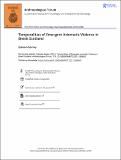Temporalities of emergent axiomatic violence in Brexit Scotland
Abstract
Following an acrimonious referendum on European Union membership, the UK was plunged into chaos as people attempted to negotiate a deeply divided domestic political landscape. In Scotland, things were further complicated by the independence question and the Scottish National Party’s (SNP) call for a second independence referendum. In light of the Brexit result, since 2016 many citizens of Scotland have re-thought their position on independence owing to emergent axiomatic violence located in the UK’s split from Europe. This article examines the different temporalities involved with the emergent axiomatic violence of Brexit as experienced in Scotland. For those who once supported the Union, Brexit is understood as a moment of violent and unforeseen rupture, emerging from a one-off event in the present. In contrast, nationalists speak of Brexit as representative of the accretive slow violence brought on through historical imbalances in UK politics; Brexit was to be expected, emerging from long-term processes. For EU migrants, the violence of Brexit is built into their futures, as they contemplate work and family life in a drastically changed socio-political landscape. Although the ‘emergent’ aspect of the violence inherent in Brexit is dependent on perspective, all agree that the violence is axiomatic, part of everyday life in Brexit Britain.
Citation
Manley , G 2021 , ' Temporalities of emergent axiomatic violence in Brexit Scotland ' , Anthropological Forum , vol. 31 , no. 3 , pp. 275-290 . https://doi.org/10.1080/00664677.2021.1969642
Publication
Anthropological Forum
Status
Peer reviewed
ISSN
0066-4677Type
Journal article
Collections
Items in the St Andrews Research Repository are protected by copyright, with all rights reserved, unless otherwise indicated.

